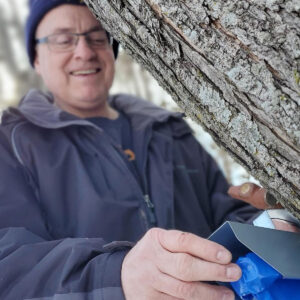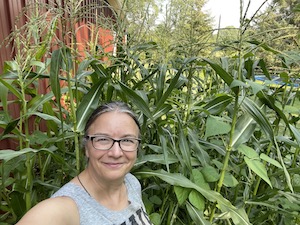
Mark Rutkiewicz, Co-Director.
Thirty years ago, Mark felt compelled to purchase the core of what once was a 240 acre farm, created in the 1860s.
Over the decades, he worked tirelessly to restore the original 1860s farm house, granary, dairy, and well house. He planted trees and started a serious tradition of re-use of anything re-usable. An engineer by education, he built a workshop (using what he could from a decrepit machine shed) and created a system for organizing what we affectionately call “the hoard.” We are are able to easily “shop” the hoard and repurpose many things for new projects or to repair buildings and equipment. Mark has also been instrumental in teaching others the skills necessary to create and repair things–from a heavy-duty tipi trailer to converting vehicles to tiny homes.
Professionally, Mark is well-known in the medical device industry. He created Consiliso, a system for improving medical device quality, and authored two books on the subject.
Personally, Mark is descended from eastern Europeans–the first American born on his father’s side, the second on his mother’s. His ancestors had a deep relationship with the land in Poland and Slovenia, sustainably farming it for hundreds of years. Mark has always sought a deeper connection to Turtle Island, the land upon which he and his children were born.

Anakwad Migizi (Wendy Stone), Co-Director.
Anakwad is of Chippwe and Peoria descent, raised in Michigan. She is Ajiijak Dodem (Crane Clan) and her maternal ancestors are from the south shore of Lake Superior (Michigan and Wisconsin) and the Ohio River valley.
On her paternal side, Anakwad is a direct descendant of Gouvenor Morris, who both signed the United States Declaration of Independence and was dubbed the “technical writer” of the US Constitution. That “We the People” preamble to the Constitution? Yeah, those were her many-great grandfather’s words. She comes by her MA in Technical Communications degree honestly, through both hard work and ancestral memory. Anakwad/Wendy is dedicated to working to foster the kind of equitable and sustainable future both sides of her ancestry dreamed about.
She has worked in peace and reconciliation efforts between Indigenous people and Christian church organizations for most of her adult life, as the grand-daughter of a Methodist Minister and the niece of a residential boarding school survivor. Anakwad has been a front-line activist against extractive industries and the violation of First Nation treaty rights, and continues to support those who fight for the land, water, and treaties as well as racial, social, and environmental justice.
First and foremost, Anakwad is a daughter of this land and has been gifted with the wisdom of her Anishinaabe ancestors. She spends most of her time encouraging the plants and animals within the care of Migiziwazison, and teaching others what she has learned from her years as an ashkabewois (helper) in ceremony and as a professional in scientific industries.


